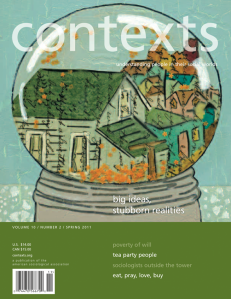
Spring 2011
Volume: 10 | Number: 2
The Vanishing Catholic Priest
Brian Conway examines the decline in vocations in Ireland and the U.S., and considers what it means for the future of international Catholicism. Read More
The Purchase of Enlightenment
In Eat Pray Love, the film adaptation of author Elizabeth Gilbert’s tale of travel and self-discovery, we see American consumer culture on display. Lucrative industries are ready to help women navigate crises of identity, but these solutions might be nothing more than salves. Read More
Selling Feminism, Consuming Femininity
For over half a century, magazines aimed at teens have been teaching girls how to inhabit stereotypical gender roles. Surprisingly, though the celebrities on the covers have changed, the messages have remained the same. Read More
Facebook’s Boundaries
Facebook was established to help students keep in touch after graduation, but now it’s being credited with major roles in everything from domestic elections to international uprisings. In its no-longer-insular world, Facebook transforms the private into the public. Read More
Who are “We the People”?
The Tea Party trumpets itself as a movement of the people. But who is included in “We the People”? Ruth Braunstein tries to answer. Read More
Cultures of the Tea Party
While the Tea Party Movement has emerged as a true player American politics, it has not yet come to be identified with a set of core beliefs. The authors use survey data to discuss the opinions that make up the movement. Read More
The World Without Us?
The future of higher education is up for grabs. Diane Pike finds, in two recent books, a call to action for social scientists and academics in the liberal arts. Read More
Gender Norms in the Twilight Series
The hit series Twilight replicates gender stereotypes that sociologists have been debunking for decades. Rebecca Hayes-Smith highlights the gravity of making light of harmful gender messages. Read More
Road Warriors and Water Hogs
While globalization has expanded the flow of goods, environmental movements have worked to constrain these flows by constructing local-based networks. Ted Conover's The Routes of Man traces four routes of globalization, while Kate A. Berry and Eric Mollard shed light on the environmental challenges these routes create in Social Participation in Water Governance and Management. Read More
Secrets of a Feminist Icon
Rosie the Riveter wasn’t always a feminist icon. Her roots lie in inspiring Westinghouse workers toward the war effort, and it wasn’t until the 1950s and ‘60s that women’s rights movements reframed the way we see Rosie. Read More
